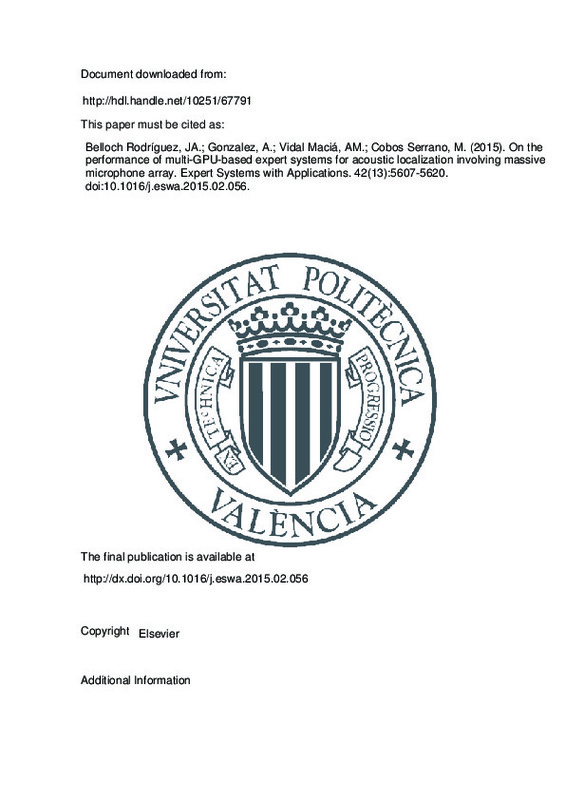JavaScript is disabled for your browser. Some features of this site may not work without it.
Buscar en RiuNet
Listar
Mi cuenta
Estadísticas
Ayuda RiuNet
Admin. UPV
On the performance of multi-GPU-based expert systems for acoustic localization involving massive microphone array
Mostrar el registro sencillo del ítem
Ficheros en el ítem
| dc.contributor.author | Belloch Rodríguez, José Antonio
|
es_ES |
| dc.contributor.author | Gonzalez, Alberto
|
es_ES |
| dc.contributor.author | Vidal Maciá, Antonio Manuel
|
es_ES |
| dc.contributor.author | Cobos Serrano, Máximo
|
es_ES |
| dc.date.accessioned | 2016-07-19T08:19:07Z | |
| dc.date.available | 2016-07-19T08:19:07Z | |
| dc.date.issued | 2015-08-01 | |
| dc.identifier.issn | 0957-4174 | |
| dc.identifier.uri | http://hdl.handle.net/10251/67791 | |
| dc.description.abstract | Sound source localization is an important topic in expert systems involving microphone arrays, such as automatic camera steering systems, human-machine interaction, video gaming or audio surveillance. The Steered Response Power with Phase Transform (SRP-PHAT) algorithm is a well-known approach for sound source localization due to its robust performance in noisy and reverberant environments. This algorithm analyzes the sound power captured by an acoustic beamformer on a defined spatial grid, estimating the source location as the point that maximizes the output power. Since localization accuracy can be improved by using high-resolution spatial grids and a high number of microphones, accurate acoustic localization systems require high computational power. Graphics Processing Units (GPUs) are highly parallel programmable co-processors that provide massive computation when the needed operations are properly parallelized. Emerging GPUs offer multiple parallelism levels; however, properly managing their computational resources becomes a very challenging task. In fact, management issues become even more difficult when multiple GPUs are involved, adding one more level of parallelism. In this paper, the performance of an acoustic source localization system using distributed microphones is analyzed over a massive multichannel processing framework in a multi-GPU system. The paper evaluates and points out the influence that the number of microphones and the available computational resources have in the overall system performance. Several acoustic environments are considered to show the impact that noise and reverberation have in the localization accuracy and how the use of massive microphone systems combined with parallelized GPU algorithms can help to mitigate substantially adverse acoustic effects. In this context, the proposed implementation is able to work in real time with high-resolution spatial grids and using up to 48 microphones. These results confirm the advantages of suitable GPU architectures in the development of real-time massive acoustic signal processing systems. | es_ES |
| dc.description.sponsorship | This work has been partially funded by the Spanish Ministerio de Economia y Competitividad (TEC2009-13741, TEC2012-38142-C04-01, and TEC2012-37945-C02-02), Generalitat Valenciana PROMETEO 2009/2013, and Universitat Politecnica de Valencia through Programa de Apoyo a la Investigacion y Desarrollo (PAID-05-11 and PAID-05-12). | en_EN |
| dc.language | Inglés | es_ES |
| dc.publisher | Elsevier | es_ES |
| dc.relation.ispartof | Expert Systems with Applications | es_ES |
| dc.rights | Reserva de todos los derechos | es_ES |
| dc.subject | Graphics Processing Units | es_ES |
| dc.subject | Microphone arrays | es_ES |
| dc.subject | Sound source localization | es_ES |
| dc.subject | Steered Response Power | es_ES |
| dc.subject.classification | CIENCIAS DE LA COMPUTACION E INTELIGENCIA ARTIFICIAL | es_ES |
| dc.subject.classification | TEORIA DE LA SEÑAL Y COMUNICACIONES | es_ES |
| dc.title | On the performance of multi-GPU-based expert systems for acoustic localization involving massive microphone array | es_ES |
| dc.type | Artículo | es_ES |
| dc.identifier.doi | 10.1016/j.eswa.2015.02.056 | |
| dc.relation.projectID | info:eu-repo/grantAgreement/MICINN//TEC2009-13741/ES/Spatial Audio Systems Based On Massive Parallel Processing Of Multichannel Acoustic Signals With General Purpose-Graphics Processing Units (Gp-Gpu) And Multicores/ / | es_ES |
| dc.relation.projectID | info:eu-repo/grantAgreement/UPV//PAID-05-11/ | es_ES |
| dc.relation.projectID | info:eu-repo/grantAgreement/UPV//PAID-05-12/ | es_ES |
| dc.relation.projectID | info:eu-repo/grantAgreement/MINECO//TEC2012-37945-C02-02/ES/PROCESADO DE SONIDO PARA LA INTERACCION HOMBRE-MAQUINA: ENTORNOS MULTIFUENTE/ | es_ES |
| dc.relation.projectID | info:eu-repo/grantAgreement/MICINN//TEC2012-38142-C04-01/ES/PROCESADO DISTRIBUIDO Y COLABORATIVO DE SEÑALES SONORAS: CONTROL ACTIVO/ | es_ES |
| dc.rights.accessRights | Abierto | es_ES |
| dc.contributor.affiliation | Universitat Politècnica de València. Departamento de Comunicaciones - Departament de Comunicacions | es_ES |
| dc.contributor.affiliation | Universitat Politècnica de València. Instituto Universitario de Telecomunicación y Aplicaciones Multimedia - Institut Universitari de Telecomunicacions i Aplicacions Multimèdia | es_ES |
| dc.contributor.affiliation | Universitat Politècnica de València. Departamento de Sistemas Informáticos y Computación - Departament de Sistemes Informàtics i Computació | es_ES |
| dc.description.bibliographicCitation | Belloch Rodríguez, JA.; Gonzalez, A.; Vidal Maciá, AM.; Cobos Serrano, M. (2015). On the performance of multi-GPU-based expert systems for acoustic localization involving massive microphone array. Expert Systems with Applications. 42(13):5607-5620. https://doi.org/10.1016/j.eswa.2015.02.056 | es_ES |
| dc.description.accrualMethod | S | es_ES |
| dc.relation.publisherversion | http://dx.doi.org/10.1016/j.eswa.2015.02.056 | es_ES |
| dc.description.upvformatpinicio | 5607 | es_ES |
| dc.description.upvformatpfin | 5620 | es_ES |
| dc.type.version | info:eu-repo/semantics/publishedVersion | es_ES |
| dc.description.volume | 42 | es_ES |
| dc.description.issue | 13 | es_ES |
| dc.relation.senia | 297053 | es_ES |
| dc.contributor.funder | Universitat Politècnica de València | es_ES |
| dc.contributor.funder | Generalitat Valenciana | es_ES |







![[Cerrado]](/themes/UPV/images/candado.png)

